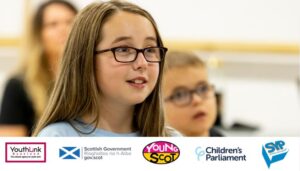The report covers key findings for children ages 8 to 12 and young people ages 12-25 as well as questions for consideration.

We are thrilled to announce the launch of ‘Your Mental Health & Wellbeing Insights Report’ an effective consultation on the views of children and young people on accessing information and support for mental health and wellbeing.
This report is the result of extensive research and collaboration with children, young people and national partners and provides valuable insights and information to help improve health and wellbeing for all.
The Scottish Government commissioned YouthLink Scotland to work in partnership with Young Scot, Children’s Parliament, and Scottish Youth Parliament as part of an engagement activity to gather the views of children and young people on accessing information and support for mental health and wellbeing.
Findings from the research will help inform decision-making, service design, and delivery for the Children and Young People’s Mental Health and Wellbeing Joint Delivery Board (JDB) and its successor body.
According to the findings, children and young people aged 8-to-25 years old reported common themes when it comes to getting information or support for their mental health and wellbeing. They stressed the importance of relationships with others in spaces where they feel comfortable to talk about mental health and wellbeing. The respondents weighed up the risks and benefits of support before accessing it, with confidentiality being the most important factor when seeking information and support.
When seeking support, children and young people valued trusting relationships, kindness, validation, non-judgmental responses, as well as a comfortable, private, and welcoming physical space. The findings emphasised that access to face-to-face support is a priority for children and young people and needs to be as local as possible.
Scottish Government Mental Wellbeing Minister Kevin Stewart said:
“We would like to thank YouthLink Scotland along with Young Scot, Children’s Parliament and Scottish Youth Parliament for producing the Insights report.
“We welcome the findings from the report and would like to thank all children and young people who took the time to complete the survey and those who supported them to participate.
“The voices and views of children and young people is directly informing Board recommendations.
“The findings are a clear reminder about the importance of ensuring children, young people and their families are central to the development of mental health supports and services”.
Tim Frew, CEO, YouthLink Scotland commented:
“The launch of the ‘Your Mental Health & Wellbeing Insights Report’ gives us a really valuable understanding into what children and young people need to support their mental health and wellbeing, and how they want information provided to them.
“The findings emphasise the importance of face-to-face support in building trusting relationships, providing kindness and validation, fostering non-judgmental environments, and creating welcoming physical spaces for young people to discuss their mental health and wellbeing. I hope that this report will help shape a different approach to the delivery of mental health services and support as part of the overall reform work.”
Young Scot CEO Kirsten Urquhart added:
“Mental health and emotional wellbeing remains a huge issue for young people. Their views and experiences expressed in this report provide valuable insights on how they access information or support – and it’s vital they are listened to.”
Abbie Wright Member of the Scottish Youth Parliament commented:
“We are delighted to see this work being published. Children and young people’s mental health and wellbeing needs to remain as a priority. We are therefore looking forward to seeing the recommendations being implemented to improve children and young people’s mental health and wellbeing in the future.”
Dr Colin Morrison, Children’s Parliament said:
“As we await UNCRC incorporation this report is a call to action, directing adults who love and care for children as to what they can do to ensure every child’s right to adequate mental health information and support.”